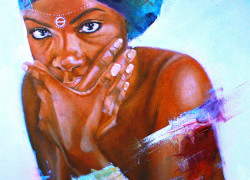
Words by Fabrice Wilmann
“We don’t talk about people having issues with their identity or figuring out how to be what you call a third culture kid where you’re trying to figure out where you fit. There’s no space to talk about that at the dinner table so it’s really important as artists that we make sure to keep that space active, keep those conversations ongoing because it’s not just about reaching out to people who have the same experience, it’s also about opening conversations between multiple generations.” – Natasha Jynel
Can you walk me through your project for this year’s Fringe Festival?
The show that I’ve got on is called Threadbare. It is an exploration of contemporary Australian identity through multiple lenses. It’s looking at things around fashion and how we dress ourselves – customary dress vs. contemporary style and how those things interrelate to one another. I’m also looking at how dance and movement from a cross-section of different cultural backgrounds can have a lot of relevance to each other, even if at first glance they may not seem that way. It also looks at things around mental illness, disabilities, physical illness, poverty, immigration, migration. There’s definitely a very feminist undertone, looking at things around what femininity is, different ways of being yourself basically.
Who is involved in the piece?
The piece features quite a few multicultural artists: a spoken word artist, poet and musician who is of Tongan and Lebanese descent; Kathleen Gonzalez is the choreographer for the show and is of Colombian descent; myself, my parents are from Barbados and I grew up in America as well as here.
What form will the performance take?
It’s going to be a movement-based piece. We’ll be looking at movements from Afro-Colombian dance, Afro-Caribbean dance, Tongan dance, and also some contemporary dance – and leading those things together to make a visual narrative and also mixing spoken word art with music, primarily from local artists. So even though there may only be about five to seven different ethnicities or cultural groups represented in the show itself by the performers, there will be a much broader spectrum represented in the musical and poetic sound-scape of the show.
How do you think your performance will speak to Australian audiences vs. other markets?
One of the things I would like to do is travel the show to all the different communities that are represented in it. Because it will have a different impact depending on where it’s shared. I think the most important thing about it being shown in Australia is about actually opening it up when talking about what is an Australian audience. I think that contemporary Australia is, firstly, home to the oldest Indigenous culture in the world – so that’s definitely something that needs to be represented, because it’s something very sacred that this country has. And there’s also a huge multicultural community here and that needs to be respected.
Threadbare is basically saying that the fabric of society is at a point where in some places it’s been worn a bit thin, whether it’s been through racism, or trauma, or violence, and right now we have a specific opportunity to look at the individual threads holding society together and also look for ways to make those reconnections – and by doing so, make it even stronger than it was before.
Would you say that you’re inspired by your own personal experiences?
What I’m inspired by the most is the wanderer because I’m definitely a wanderer. I’m inspired by people who haven’t had the luxury of being born in one place, raised in one place, identifying with one group, and feeling either confined or constrained or celebrating their one-dimensional identity. I’m interested in people who have, for whatever reason, have had to readapt to a new way of living, people who have been people who have survived traumas, the people whose lives have shaped them and forced them at one point or another to sit with themselves and re-identify who they are and where they’re going.
Do you have any immediate plans following the festival?
Immediately after the festival I am going to start looking at making a fashion book because I also produce fashion editorials and events, always with a focus on multicultural representations, representing different body types and ages, and gender presentations, and… I think it’s really important for kids growing up to be able to have something to hold in their hands.
Do you already have a working title for the project or is it still early days?
I do have a working title, it’s MUF – so Melbourne Underground Fashion. Don’t steal that, I haven’t decided whether I’m going to use that yet.

